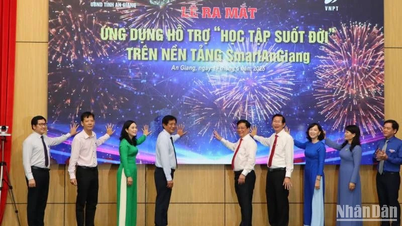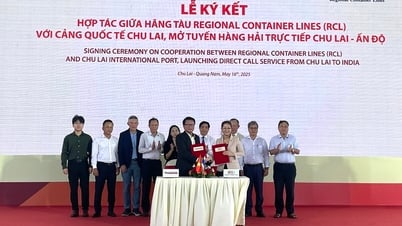The draft Law on Science , Technology and Innovation is expected to create a breakthrough legal corridor, promoting the development of this key field. Delegate Nguyen Quang Huan ( Binh Duong delegation) had a discussion on the sidelines of the National Assembly about key issues, from the mechanism of sharing benefits for scientists to creating a real science and technology market, attracting business investment.

There should not be a rigid 30% rule.
National Assembly Delegate Nguyen Quang Huan said that one of the notable new points of the Draft Law on Science, Technology and Innovation is the provision that scientists are entitled to 30% of the income generated from research results. I think this is a progressive policy, clearly demonstrating the view that science and technology are the key driving force for national development.
Accordingly, this regulation recognizes the efforts, intelligence and real contributions of scientists, linking scientific research with practical application results. This policy will stimulate creative motivation, help researchers dare to think, dare to do, proactively seek research directions with high applicability and practical value. In addition, sharing benefits from research results is also a way to retain talent, especially in the context of competition for scientific resources not only domestically but also internationally.
However, delegates said that the regulation that researchers are entitled to a minimum of 30% of the income generated from research results is not really flexible. Instead, a more flexible regulation should be considered, such as from 10% to 35%, depending on each specific stage of the research process.
“Because the level of risk and the actual contribution of scientists at each stage are different. In the trial manufacturing and commercialization preparation stages, when the product is gradually completed and has clear potential, it is reasonable to share higher benefits. On the contrary, in the early stages of research, when the risk is still high, determining too high a benefit ratio will cause difficulties for investment or transfer units,” the delegate analyzed.
Therefore, according to the delegate, there needs to be a mechanism for reasonable benefit allocation according to each development stage of research results, to both encourage innovation and ensure harmony of interests between scientists, management units and application partners.
Removing policy obstacles, 'fueling' investment for businesses
Regarding the policy of identifying strategic technologies and the mechanism for ordering research from businesses, delegate Nguyen Quang Huan said that the key point is to create a real science and technology market, connecting scientists and businesses. Previously, the State often invested in research, but the results were not close to social needs. The new law is opening the way for businesses to participate right from the testing stage - because businesses understand what the market needs.
However, in order for this participation to be truly effective and to encourage businesses to be more daring, the delegate also pointed out the obstacles that need to be resolved. Specifically, he said that the issue of copyright and the division of benefits between scientists and businesses still needs to be regulated more clearly. Article 28 of the Law has mentioned it, but it is still quite strict, which can make businesses hesitate to invest. Therefore, it is necessary to create a flexible mechanism, so that businesses can boldly invest in manufacturing, testing, and then commercialization. The State can also co-invest with businesses in large, highly applicable topics.
In addition to creating conditions for cooperation and benefit-sharing mechanisms, the draft Law also recognizes significant advances in policies that directly support businesses. Specifically, costs for science, technology and innovation activities are considered reasonable costs before tax, which has never been done before. In addition, the Law encourages businesses to establish internal science, technology and innovation funds. However, green development and digital economy are not only in one law. These contents are also clearly stated in Government Resolutions and other laws. If businesses grasp technological trends, especially digital infrastructure, they can "take shortcuts" and catch up with the level of advanced countries.
Not only stopping at financial incentives, another important new point to minimize risks for businesses when boldly innovating is also mentioned. This law also encourages businesses through a testing mechanism, meaning that if the research is not successful, the business will not be held responsible, unless there is a deliberate violation. This is a big step forward to help businesses feel secure in investing in research and innovation.
Along with promoting enterprises to conduct their own research, bringing research results from public organizations to the market is also a problem that needs to be solved. Regarding the commercialization of research results in research institutes and universities, delegate Nguyen Quang Huan said that this is still a point under discussion. The policy is to quickly remove and cut down on cumbersome procedures so that scientists do not have to waste time explaining documents. The Law has shown that spirit, but as I said, the Law cannot stipulate everything in detail. We need a system of decrees and circulars to specify the principles set forth by the Law. Only then can scientists truly commercialize their products smoothly.
Delegate Nguyen Quang Huan assessed that the Draft Law was issued very timely, following Resolution No. 193/2025/QH15 of the National Assembly on piloting a number of special mechanisms and policies to create breakthroughs in the development of science, technology, innovation and national digital transformation (Resolution 193) to concretize Resolution 57 of the Politburo on the development of science, technology and innovation (Resolution 57). Immediately after Resolution 57 was issued, public opinion, voters, businesses and scientists all expected a clear legal corridor for implementation.
Resolution 193 is the first step, but due to the limitations of the document's form, it cannot cover everything like a law. Therefore, amending the 2013 Law on Science and Technology is necessary. This amendment is more comprehensive, clearly mentioning the role of enterprises in research and development of science and technology. Regarding administrative procedures, the new Law has strongly simplified: eliminating 9 to 11 old procedures, retaining only two mandatory procedures and adding 4 new procedures to suit practical activities.
However, the Delegate also suggested that in the process of perfecting the law and its implementing guidelines, specific guidance is needed to avoid the situation where regulations are correct but difficult to implement. If regulations are well implemented, it will encourage the creativity of scientists.
Source: https://khoahocdoisong.vn/de-xuat-nha-khoa-hoc-huong-loi-theo-giai-doan-nghien-cuu-post1542051.html


![[Photo] Party and State leaders attend the special art program "You are Ho Chi Minh"](https://vphoto.vietnam.vn/thumb/1200x675/vietnam/resource/IMAGE/2025/5/18/6895913f94fd4c51aa4564ab14c3f250)

![[Photo] Party and State leaders visit President Ho Chi Minh's Mausoleum](https://vphoto.vietnam.vn/thumb/1200x675/vietnam/resource/IMAGE/2025/5/19/d7e02f242af84752902b22a7208674ac)
![[Photo] Special flag-raising ceremony to celebrate the 135th birthday of President Ho Chi Minh](https://vphoto.vietnam.vn/thumb/1200x675/vietnam/resource/IMAGE/2025/5/19/1c5ec80249cc4ef3a5226e366e7e58f1)





















































































Comment (0)